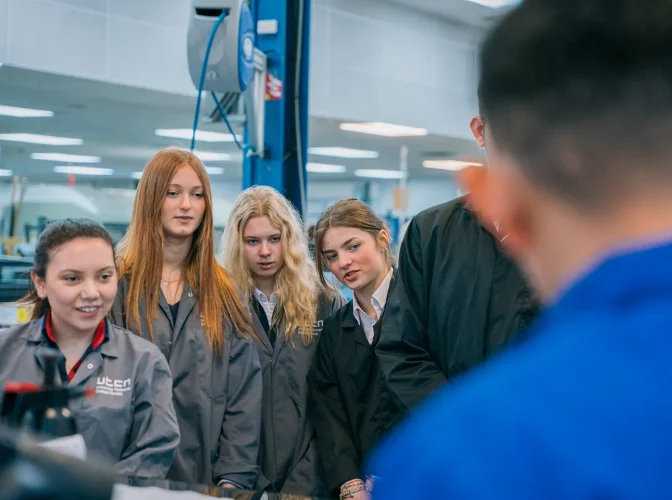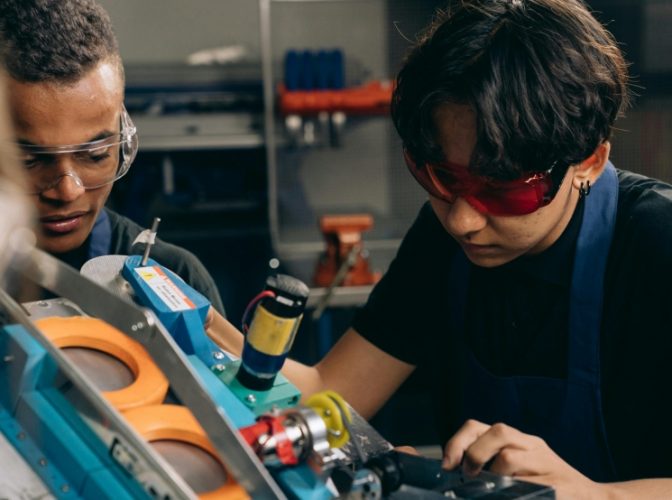
Unlocking the innovation potential of FE colleges
The role of Further Education (FE) colleges in supporting innovation has huge potential, but has largely been neglected. We know that a lack of relevant management and technical skills are barriers to the successful diffusion of new technology, particularly to SMEs. FE colleges have a key role to play in providing these skills. But research has also identified significant potential for FE colleges to assume more responsibility for supporting businesses to develop new capabilities that will unlock opportunities for innovation-led economic growth.

Supporting SMEs through incremental innovation
Innovation in business, as defined by the OECD Oslo Manual (2018), refers to the implementation of a new or significantly improved product, process, marketing strategy, or organisational method that creates value for a firm, its customers, or both. This innovation is not limited to revolutionary technological advancements but also includes continuous, incremental improvements.
Radical innovation involves breakthroughs that establish entirely new markets or disrupt existing ones, such as the development of the internet or the introduction of electric vehicles. In contrast, incremental innovation focuses on the gradual improvement of existing products, processes or services. Colleges may well have stronger links with SMEs than other organisations in the innovation ecosystem, and these SMEs would benefit from engaging in incremental rather than radical innovation.
How FE colleges can support innovation in business
Colleges can offer specialised training programs to help employees learn new skills, such as advanced manufacturing techniques, digital tools or updated methods that support ongoing small improvements.
Case study
Colleges can work with businesses to research ways to improve existing products or processes, which can lead to gradual innovations.
Case studies
By partnering with businesses, students can work on real-life business challenges, bringing fresh ideas while giving companies a chance to test out potential improvements.
Close relationships with colleges give businesses access to the latest industry knowledge, research, and technology, which can be used to make small but meaningful changes.
Case study
Colleges can organise workshops and offer consulting services tailored to a company’s needs, focusing on incremental improvements by adopting new tools, techniques, or management approaches.
Further Education colleges are well placed to support innovation, particularly among SMEs. By providing essential technical and management skills, they can help businesses adopt new technologies. With strong local links and a practical focus, colleges have the potential to drive incremental innovation - boosting productivity and contributing to economic growth in ways often overlooked in the wider innovation ecosystem.
Reports & publications
Generative AI in Further Education
This report examines how FE colleges in England are starting to use generative AI and identifies the support, conditions and guidance needed to enable wider, thoughtful and effective adoption across the sector.
Author(s)
David Jennings, Daniel Brett
Review of the potential for E-Assessment in Technical Education in England
This report focuses specifically on the current state of play and potential for further development of the use of e-assessment for assessing technical education in England. “E-assessment” refers here in broad terms to the assessment of knowledge, skills and capabilities of people through technology.
Author(s)
Stuart Edwards
A review of the relationship between business support services and further education
Report from THINK providing the key findings and analysis of a project undertaken on behalf of Gatsby, reviewing business support provision in England and its relationship with further education.
Author(s)
James Farr
Skills Foresighting – Automotive Industrial Digitisation Case Study
This paper presents the results of a skills foresighting project designed to identify the future skills needs of the workforce required to enable the adoption of industrial digitisation in automotive manufacturing. The work was undertaken by High Value Manufacturing Catapult and Enginuity with the support of the Gatsby Charitable Foundation.
Author(s)
John Lanham, Paul Shakspeare, Neill Goodliffe
Further Education Colleges and Innovation
This report by Elaine Baxter, former head of the Innovation Lab at Procter & Gamble, was commissioned to better understand the role that colleges in England play in supporting innovation in their local areas.
Author(s)
Elaine Baxter
Case Study : Loughborough College AI+ Programme
Loughborough College’s AI+ programme is designed to help small and medium-sized enterprises (SMEs) adopt AI and other digital tools to drive business growth and innovation.
Author(s)
The Gatsby Charitable Foundation
Case Study : Edinburgh College and Anturas
Anturas, a specialist in safety verification under the Railways and Other Guided Transport Systems (ROGS) Regulations 2006, partnered with Edinburgh College to improve the efficiency of compliance processes for light rail projects.
Author(s)
The Gatsby Charitable Foundation
Case Study : North West Regional College (NWRC) and Broighter Gold
Broighter Gold, a well-known rapeseed oil producer based in Limavady, worked with NWRC to find sustainable and effective ways to use the waste cake left after pressing rapeseed for oil.
Author(s)
The Gatsby Charitable Foundation
Case Study : City of Glasgow College and Altitude Thinking Ltd.
Designed by Altitude Thinking Ltd.,with the support of City of Glasgow College, the Aquabot is a remote-controlled aquatic vehicle which can monitor and assess water quality in real time.
Author(s)
The Gatsby Charitable Foundation
Manufacturing the Future Workforce
This report by the High Value Manufacturing Catapult (HVMC) and supported by Gatsby Education, argues that the UK needs a new Skills Value Chain in which Catapults are key to develop the workforce for a successful innovative future.
Author(s)
Ian Collier, Paul Shakespeare
Key Indicators in STEM Education 2020
The fifth edition of Key Indicators in STEM Education, bringing together key data relating to Science, Technology, Engineering and Mathematics (STEM) education, focusing on trends in the numbers of individuals studying STEM subjects at GCSE, A-level and undergraduate degree levels.
Author(s)
The Gatsby Foundation
Technicians and Innovation: A Literature Review
This report commissioned by the Gatsby Foundation and authored by Professor Paul Lewis, Economics Professor at King's College London, explores the direct and important contributions technicians make to both radical and incremental innovation in advanced manufacturing in the UK.
Author(s)
Paul Lewis


